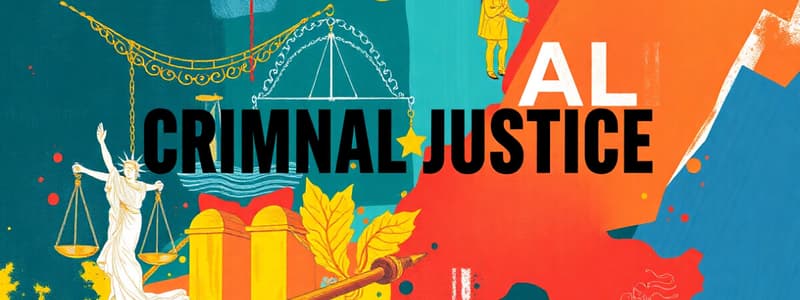Podcast
Questions and Answers
What is the term for the party that seeks to reverse a decision in a higher court?
What is the term for the party that seeks to reverse a decision in a higher court?
Appellant
What term describes the requirement for proof needed to secure a conviction in criminal court?
What term describes the requirement for proof needed to secure a conviction in criminal court?
Beyond a Reasonable Doubt (BRD)
Define the term 'Bail' in the context of criminal justice.
Define the term 'Bail' in the context of criminal justice.
Bail is the release of a person accused of a crime prior to trial under conditions ensuring their appearance in court.
What does a 'Bench Warrant' signify?
What does a 'Bench Warrant' signify?
Explain the concept of 'Pretrial Detention'.
Explain the concept of 'Pretrial Detention'.
What role does a Probation Officer play in the criminal justice system?
What role does a Probation Officer play in the criminal justice system?
What is the purpose of a 'Petition for a Writ of Certiorari'?
What is the purpose of a 'Petition for a Writ of Certiorari'?
What does the term 'Restitution' refer to in criminal sanctions?
What does the term 'Restitution' refer to in criminal sanctions?
What is the meaning of 'En Banc' in the context of appellate courts?
What is the meaning of 'En Banc' in the context of appellate courts?
Describe the analogy represented by the 'Criminal Justice Funnel'.
Describe the analogy represented by the 'Criminal Justice Funnel'.
What does the term 'Beyond a Reasonable Doubt' signify?
What does the term 'Beyond a Reasonable Doubt' signify?
Explain the term 'Flat Timed' in relation to sentencing.
Explain the term 'Flat Timed' in relation to sentencing.
What is meant by the term 'Burden of Proof'?
What is meant by the term 'Burden of Proof'?
What is an 'Oral Argument' in the appellate court context?
What is an 'Oral Argument' in the appellate court context?
Define 'Sentencing Guidelines' in the judicial system.
Define 'Sentencing Guidelines' in the judicial system.
What is the role of a 'Monetary Fine' in the criminal justice system?
What is the role of a 'Monetary Fine' in the criminal justice system?
In what circumstance would 'Pretrial Detention' occur?
In what circumstance would 'Pretrial Detention' occur?
What is a 'Bench Warrant' and who issues it?
What is a 'Bench Warrant' and who issues it?
Flashcards are hidden until you start studying
Study Notes
Appeal
- When a party loses a case, they can ask a higher court to review the decision.
Appellant
- The losing party in a lower court who requests a review from a higher court.
Bail
- A method of releasing a person accused of a crime before trial.
- Bail is conditional, typically requiring the person to appear in court.
Bench Warrant
- An arrest warrant issued by a judge, not by the police.
Beyond a Reasonable Doubt
- The legal standard of proof required for a criminal conviction.
Burden of Proof
- The responsibility to prove disputed facts.
Criminal Justice Funnel
- A visual representation of the criminal justice process.
- It shows that many crimes are committed, but very few result in prison sentences.
En Banc
- "On the bench."
- Refers to all judges of an appellate court hearing a case together.
Evidentiary Standard
- The amount of evidence needed to achieve a specific criminal justice goal.
Flat Timed
- A prison sentence served in its entirety, without the possibility of parole.
Monetary Fine
- A form of punishment where a defendant pays money to the government.
Oral Argument
- An opportunity for lawyers to summarize their case to the court.
- Allows for judges to ask questions.
Petition for Writ of Certiorari
- A formal request for the Supreme Court to review a lower court decision.
Pretrial Detention
- Holding an accused person in jail before their trial.
- Reasons for pretrial detention include: inability to post bail, flight risk, or danger to the community.
Probation Officer
- Performs various duties, including:
- Conducting presentence investigations
- Preparing presentence reports
- Supervising released defendants
Restitution
- Money paid to the victim of a crime as part of a criminal sentence.
Sentence
- The punishment ordered by a court for a convicted defendant.
Sentencing Guidelines
- Rules and principles used by federal judges to determine the sentence for convicted defendants.
- Established by the United States Sentencing Commission.
Trial
- A formal examination of evidence in court to determine guilt.
United States Circuit Courts
- An older name for the United States Courts of Appeal.
United States Sentencing Commission
- Responsible for establishing sentencing policies and procedures for the federal court system.
Appeals
- A request made after a trial by a party that has lost on one or more issues, for a higher court to review the decision to determine if it was correct.
- The Appellant is the party who appeals the lower court decision, seeking reversal of the decision.
Bail
- The release prior to trial of a person accused of a crime, under specified conditions to ensure they appear in court when required.
Bench Warrant
- A type of arrest warrant issued by a judge, on behalf of the court, rather than by police action.
Beyond a Reasonable Doubt
- The legal standard of proof required to secure a conviction in criminal court.
Burden of Proof
- The duty to prove disputed facts.
Criminal Justice Funnel
- An analogy demonstrating a wide entry point and a much smaller exit point representing many crimes and very few resulting prison sentences.
En Banc
- "On the bench", all judges of an appellate court sitting together to hear a case, as opposed to the routine disposition by panels of three judges.
Evidentiary Standard
- The legally required amount of evidence necessary to achieve a particular criminal justice purpose.
Flat Timed
- A prison term served in its entirety without benefit of parole.
Monetary Fine
- Money paid to the government as punishment for wrongdoing.
Oral Argument
- An opportunity for lawyers to summarize their position before the court and answer the judges' questions.
Petition for a Writ of Certiorari
- A formal request made by a party to a lower court decision, asking the Supreme Court to review the case.
Pretrial Detention
- Detaining an accused person in jail prior to trial, because they did not post bail, or because they are a flight risk or pose a risk to the community.
Probation Officer
- Duties include conducting presentence investigations, preparing presentence reports on convicted defendants, and supervising released defendants.
Restitution
- Money paid to the victim of a crime as part of a criminal sanction.
Sentence
- The punishment ordered by a court for a defendant convicted of a crime.
Sentencing Guidelines
- A set of rules and principles established by the United States Sentencing Commission that trial judges use to determine the sentence for a convicted defendant.
Trial
- A formal examination of evidence before a judge in order to determine guilt.
United States Circuit Courts
- An old name for the United States Courts of Appeal.
United States Sentencing Commission
- The agency responsible for the establishment of sentencing policies and procedures for the federal court system.
Studying That Suits You
Use AI to generate personalized quizzes and flashcards to suit your learning preferences.




